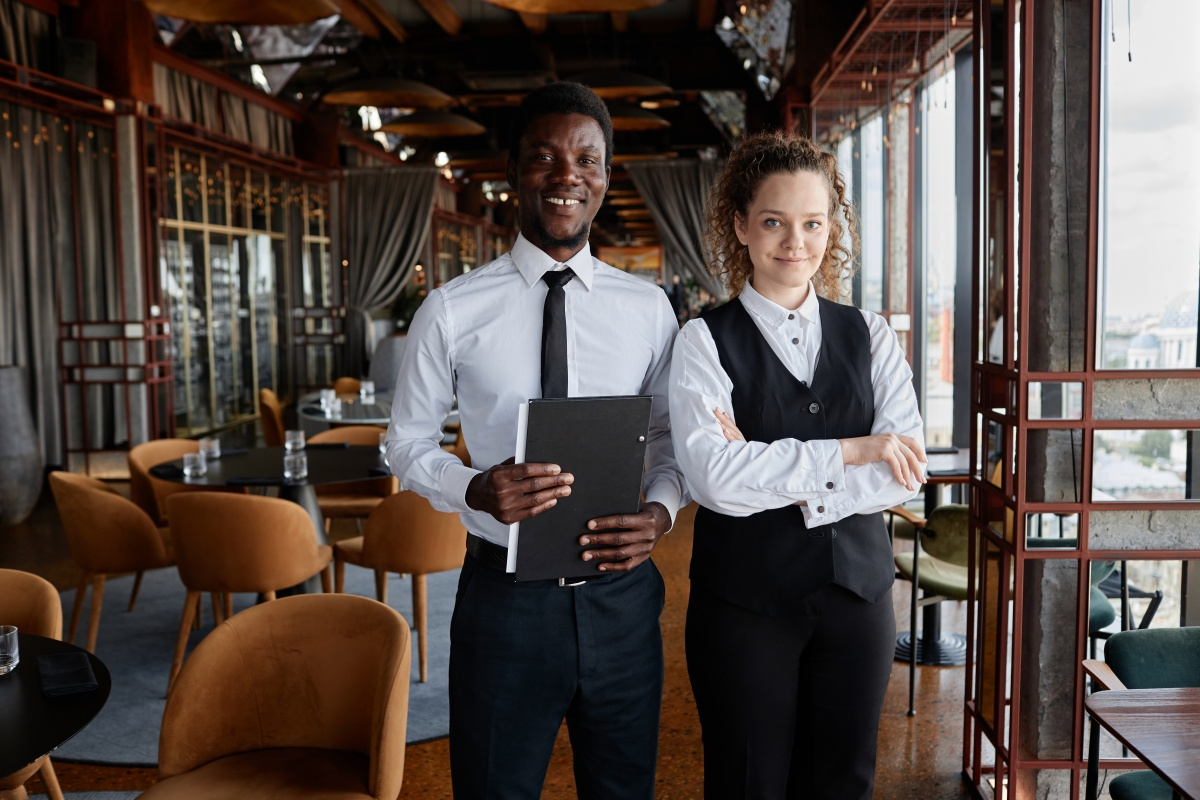Bland vs Hostie: Side-by-Side Review of Restaurant AI Voice Technologies
Resource
Find out what a restaurant host should be doing, from greeting guests and managing reservations to handling calls and coordinating with staff.
October 7, 2025
•
Skills

In any restaurant, the host stand is where the guest experience really begins. A great host doesn’t only greet and seat guests; they set the pace for service and make sure no opportunity slips through the cracks.
So, what should a restaurant host be doing? Beyond the basics, the best hosts balance warmth with efficiency, handle constant communication without missing a beat, and keep the front of house and kitchen working in sync.
Here’s a look at the key practices that elevate a host from “good enough” to indispensable, and how tools like Hostie help hosts focus on what matters most: hospitality.
As the first point of contact for guests, a restaurant host plays a vital role in shaping the dining experience through organization, communication, and attentive service. Here’s what the best hosts consistently do to elevate service.

That’s more than a quick hello. Hosts need to pace seatings so servers don’t get overwhelmed and so that every guest starts their meal on the right note. And when a table lingers longer than expected, the host makes adjustments on the fly.
For guests, that warm, professional greeting sets the tone for the rest of the meal. For staff, good organization and adaptability keep the night manageable and the dining room running smoothly.
Reservations and walk-ins really test a host’s organizational skills. They need to keep track of table status in real time and smoothly accommodate last-minute walk-ins without overbooking. When managed well, this helps ensure a steady flow of guests and no empty tables during busy times.
If something goes wrong, guests might end up waiting too long and leaving frustrated, or seats might stay empty, leading to lost revenue. The best hosts use clear, friendly communication and make sure both staff and guests stay informed. They’re always adjusting plans to keep everything running smoothly.
This is where the role can quickly get overwhelming. Hosts often juggle in-person greetings with a constantly ringing phone.
The challenge is that every missed call is lost revenue. Research shows more than two-thirds of diners will move on if a restaurant doesn’t answer the phone. And the misses add up – U.S. restaurants miss about 150 calls a month on average. At an estimated $25 a cover, that can exceed $27,000 a year in lost revenue.
That’s why many operators now pair their hosts with call-handling tools, like Hostie’s virtual concierge.
It automatically answers and logs calls in 20+ languages, routes event inquiries to the right manager, and syncs reservations directly into existing systems. This way, the human host can stay focused on hospitality in person, while every phone inquiry is still captured.

A big part of hosting happens behind the scenes. The host keeps track of which tables are clean, which ones are being bussed, and which servers are ready to take on another party.
That means constant communication with bussers, servers, and the kitchen to make sure the flow of the night stays balanced.
If a large party just sat down, the host may stagger the next few seatings so the kitchen isn’t slammed with orders all at once. If a server is in the weeds, the host might seat a smaller party in another section to give them breathing room.
These small adjustments are what keep service running smoothly instead of spiraling into chaos.
In many ways, the host is like an air traffic controller: always watching, anticipating, and coordinating so that every guest is served on time and every team member has the support they need.
The host is the first impression – but they’re also the last. Guests remember how they were greeted and how they were thanked on the way out. A professional, friendly demeanor is just as important as getting the logistics right.
This goes beyond smiling at the door. A great host notices details: holding the door for a guest in a wheelchair, congratulating a couple celebrating an anniversary, or simply making eye contact and offering reassurance when the wait is longer than expected.
That atmosphere matters. It sets the tone for the guest’s meal, but it also builds loyalty. Guests who feel welcomed from the start are far more likely to come back, even if they had to wait a few extra minutes.

A host needs more than a friendly smile. The best elevate guest experience by mastering a combination of communication, organization, problem-solving, and multitasking – skills that keep service flowing and guests coming back.
Clear, confident communication is the backbone of the role. Top hosts explain wait times, answer questions, and keep the team informed without ever sounding rushed or dismissive.
The way they deliver information often determines whether a guest feels cared for or leaves frustrated. Hostie supports this by screening calls in the background, so hosts aren’t forced to cut conversations short.
Balancing reservations, walk-ins, and waitlists takes serious organization. The best hosts track table status in real time and seat guests strategically so no section gets overwhelmed.
Hostie helps by automatically syncing phone reservations into the system, minimizing double-bookings and missed details.
Not every guest will be thrilled about waiting or where they’re seated. The strongest hosts are peacemakers, turning tense moments into loyal relationships through patience and empathy.
By handling routine inquiries automatically, Hostie ensures guests get quick, accurate answers, giving hosts more time to focus on real-time problem-solving.
A great host can juggle arrivals, waitlists, and questions simultaneously. But there’s a limit before mistakes creep in. The best hosts know when to delegate.
With Hostie routing event inquiries or large-party requests to the right manager, hosts stay focused on the front door, where their attention matters most.

Hosting is one of the toughest jobs in a restaurant. The pace is constant, and every decision affects both guests and staff. Here are some of the toughest challenges they face and how top hosts handle them.
On a Friday night or during peak service, the pressure is intense. The best hosts juggle waitlists, walk-ins, and reservations while keeping service flowing smoothly. One misstep can back up the kitchen or leave tables empty when they shouldn’t be.
Hosts often handle frustrations about long waits, table preferences, or fully booked nights. Top performers use patience, empathy, and quick problem-solving to turn complaints into opportunities for loyalty.
Splitting attention between guests at the door and calls coming in is one of the hardest parts of the job. Ignoring either means losing revenue or goodwill. That’s why many restaurants now use Hostie to step in.
It automatically answers and routes calls, and it can log event inquiries or handle multiple languages. With routine calls managed in the background, the host can stay fully present with guests, reducing stress and protecting revenue.
So, what should a restaurant host be doing? They should set the pace for service, keep reservations and waitlists flowing, answer guest questions with confidence, coordinate with staff, and create the first and last impression of your brand.
They’re part traffic controller and part ambassador for your restaurant.
It’s a tough job, but with the right support, a host can focus on the part of the role that matters most: welcoming guests and setting the stage for a great meal.
At Hostie, we don’t replace hospitality. We make sure it shines through by handling the routine phone work in the background. That way, your host can do what they do best: set the tone for unforgettable dining experiences.
See how Hostie captures every reservation, takeout order, and event inquiry. Book a demo or start your free trial today.